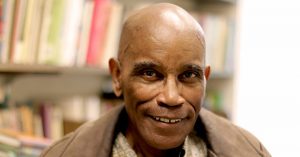By Erik Maloney, Graduate Communications Editor
James W. Coleman, professor in the Department of English & Comparative Literature, died in Chapel Hill on October 24, 2019, at the age of seventy-three. Dr. Coleman’s warm presence, unfailing generosity, and commitment to scholarship and teaching enriched the life of the department immeasurably, and we are deeply saddened by his passing.
Coleman joined the ECL faculty in 1990 and became a full professor in 2001. In 2011/12, he was nominated for a distinguished chair. Before coming to UNC, he taught briefly at San Diego State University and for sixteen years at Colorado College. At UNC, he taught many courses on African American literature, African British literature, and literary modernism and postmodernism.
Coleman’s scholarly work comprised a wide range of books and articles chiefly devoted to African American literature. He published five books: Blackness and Modernism: The Literary Career of John Edgar Wideman (1989); Black Male Fiction and the Legacy of Caliban (2001), which was selected as a Choice Outstanding Academic Title in 2003; Faithful Vision: Treatments of the Sacred, Spiritual, and Supernatural in Twentieth-Century African American Fiction (2006); Writing Blackness: John Edgar Wideman’s Art and Experimentation (2010); and Understanding Edward P. Jones (2016). He was working on a book about contemporary slave narratives, tentatively titled The Anti-Protest Novel and the Neo-Slave Narrative: The South in African American Male Fiction since Richard Wright.
“I feel very fortunate to have known James Coleman,” writes Mary Floyd-Wilson, ECL chair. “James was a dedicated scholar and thinker who found satisfaction in contemplating profound complexities in his projects; I always benefited from our conversations. He was clear-eyed but still hopeful. And he was a truly kind person. We all miss him terribly.”
For more on Coleman’s life, see the obituary published in the Durham Herald Sun. To read tributes from some of the many colleagues and students whose lives Coleman touched over the years, or to contribute your own memories, see the department’s memorial page.


